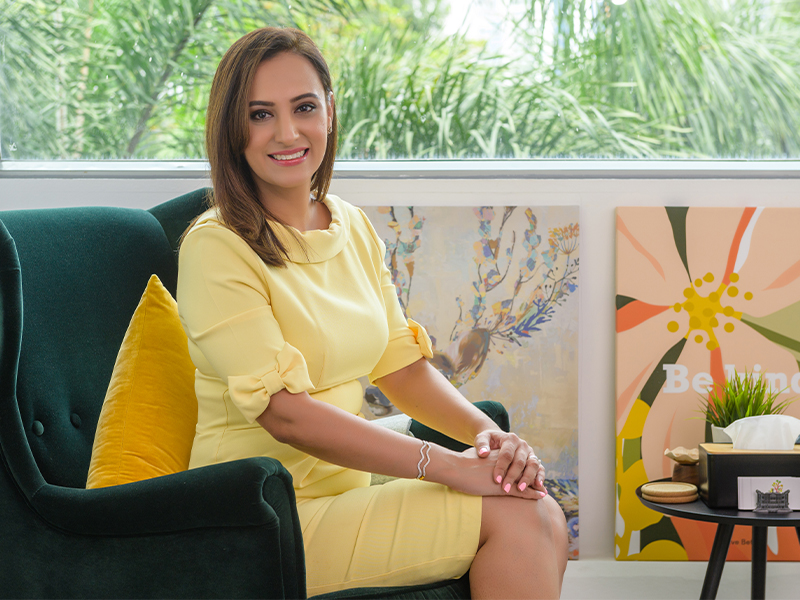Parents carry a different mental load today than they did just decades ago, making our job as caregivers more emotionally complicated than ever. Here’s how the pressures of modern-day parenting are affecting our mental health – and why not overparenting and putting our needs as parents first (including therapy for parents) may be the way forward in prioritising our children.
“Parents naturally want the best for their children and often work tirelessly to provide them with everything they want or need. This is something parents have done through the course of time. However, incidence and expectations of doing so appear to be higher now,” explains DR SANVEEN KANG. Dr Kang is a clinical psychologist and the founder of Psych Connect. She helps families manage mental health issues and provides comprehensive psychological testing and therapy in Singapore for ages two and up, into the early adult years.

The pressure of being more present as a parent
Parental expectations have changed in recent times, with the likes of shifting family dynamics, gender expectations, social media saturation and COVID-19 forcing us to re-jig our work-life balance. While some positives have come with these changes, so have additional layers of pressure.
On the one hand, we’re told to be more present as parents. Yet technology has created an expectation of always being accessible to workers and friends. We work ourselves ragged to provide everything for our kids but then get judged for not spending enough quality time with them. We feel the pressure to keep up with unrealistic parenting standards splashed across social media, only to feel inadequate when we can’t meet them.
But, we keep trying, regardless of whether we have the time and resources to do so. This has the capacity to send some of us into a spiral of anxiety, stress and self-doubt. “Parental guilt is deep and universal, and it’s also at an all-time high,” says Dr Kang.
“Parents are under an immense amount of psychological distress and often hold unhelpful beliefs around the impact their actions have on their children. Many fear they’re not doing enough or that one poor judgment as a parent will lead to dire and permanent consequences for their child.”
This constant feeling that we are failing can easily be internalised in a way that’s not healthy. “This makes it harder for us to parent in the ways we want to parent.”
However, Dr Kang says that many parents struggle to recognise these unhealthy thoughts and behaviours, which means they often don’t get the help they need for their own psychological journeys. Or, they overcompensate as parents, which can also have long-term consequences.

The harm in hovering and overparenting
For a number of mums and dads, the solution to avoiding irreparable psychological damage to their offspring from a poor judgment call or not “doing enough” is embracing a hyper-vigilant parenting style that takes “being active in a child’s life” too far. Overparenting, or “helicopter parenting”, is when a parent attempts to micromanage every aspect of their child’s life. They constantly hover to ensure good decisions are being made and physical and emotional discomfort is being thwarted.
“Being an involved parent is not a bad thing. Being active in a child’s life can increase their confidence, and build a closer bond. But, there is a fine line that divides the actively involved parent and overparenting,” says Dr Kang.
While helicopter parenting may come from a parent’s good intentions, studies reveal a direct correlation between overparenting and a child’s anxiety.
Our worries that our children might not be academically or socially successful without our constant assistance only deprives them of control over their own lives. This, in turn, increases their risk of anxiety and depression. And higher child anxiety causes higher levels of parental reinforcement of that anxiety, which only perpetuates the cycle of anxious behaviour passed between parent and child, explains Dr Kang.
What’s more, she adds, eliminating those challenging situations for our children ultimately hinders their psychological growth, and inhibits the development of confidence, competence and independence. “This can leave long-standing effects on personality development.”
So, while trying to save ourselves the anguish of seeing our children in challenging situations by micromanaging their every move may solve our stress and absolve our guilt in the moment, robbing them of those experiences completely, says Dr Kang, can keep them from becoming successful adults.
Learning from mistakes
This is not to say we should let our children see what happens when they touch a hot stove. But it does mean not intervening in social situations that could involve hurt feelings or letting them find out the consequences of not doing their homework so that they can build resilience, coping mechanisms and a sense of self-reliance.
“It’s normal to want to protect your children from the pain of making mistakes. But they need to make mistakes to learn and grow. Mistakes are an opportunity to re-evaluate what you did and what you can do differently in the future. Constantly rescuing your children keeps them from learning in this way.”
Overparenting can also result in selfcare being ignored. This in turn leads to mental health problems that take away from parents’ ability to care for their children. In fact, research shows that parents who stretch themselves too thin and then blame themselves when things go wrong are at risk of anxiety and depression – and, at times, poor parenting decisions.
Changing our perspectives of “perfect” parenting
Side-lining our own needs in the quest to be “perfect” parents can therefore be detrimental in the long term, explains Dr Kang. What many parents don’t realise is that making sure they’re okay will ensure that their kids are okay.
So, how can we help ourselves in a culture that promotes putting kids’ needs above ours?
“We need to unlearn parenthood as martyrdom and embrace a new paradigm: one where caretakers get taken care of, too. If parents have nothing left to give, kids will suffer as well.” Instead of striving to be a “perfect” parent, Dr Kang suggests focusing on being a “good enough” parent. This means preserving sufficient self-compassion to fulfil your own adult needs in order to make you a better parent.
To start, she recommends eliminating “should” from your vocabulary, practicing more mindfulness, and realising that self-care is not an indulgence but rather a way to preserve yourself for those who you care about most.
Just as you’re told on an airplane to put on your mask first before helping someone else, the first step to creating a space that is safe and healthy for our children is to first create one for ourselves,” says Dr Kang.
“Remember that your children are learning from you at all times. Putting yourself first models behaviour for your child. And this behaviour teaches children about self-esteem, relationships, dealing with stress and being an adult. Self-care is an important lesson for your children to observe and learn.”
Taking a break and getting support
Whether your self-care comes in the form of going for a walk, practicing yoga or reading a book, doing whatever makes you feel good and gives you a mental break can benefit the entire family.
Getting the psychological support you need as a parent is also an essential part of this self-care, says Dr Kang. “No problem is too small to be supported. Therapy for parents doesn’t always have to be about fixing something in yourself. It can also be about self discovery or growth.”
Psych Connect
10 Winstedt Road, #03-07/12/13/16/17
6493 0244 | psychconnect.sg
This article first appeared in the May 2023 edition of Expat Living. You can purchase the latest issue or subscribe, so you never miss a copy!
To make the most of living in Singapore, read our latest City Guide here for free!
Don't miss out on the latest events, news and
competitions by signing up to our newsletter!
By signing up, you'll receive our weekly newsletter and offers which you can update or unsubscribe to anytime.



